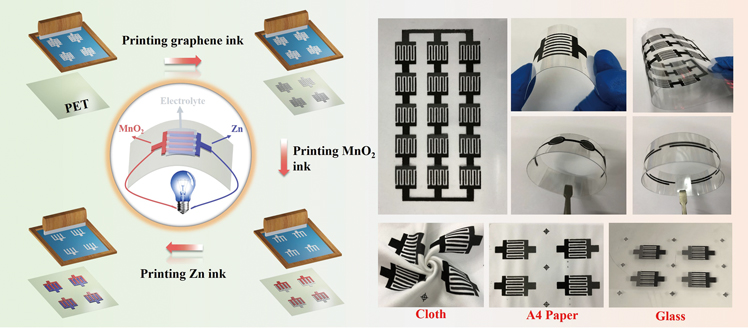A research group led by Prof. WU Zhongshuai from the CAS Dalian Institute of Chemical Physics (DICP), developed the rechargeable aqueous planar Zn//MnO2 micro-batteries fabricated by low-cost, highly efficient, scalable screen printing technique.
The rapid development of the new-generation miniaturized and wearable electronics has stimulated the demand for the corresponding miniature energy storage devices. The planar micro-batteries, which overcome the shortcomings of the traditional stacked geometry, such as large volume, poor mechanical flexibility, and easy separation of the interface under bending state, are a promising candidate for flexible electronics.
In order to address the safety issues, scientists are developing high-safety aqueous electrolytes to replace flammable organic electrolytes, and constructing high-safety aqueous planar micro-batteries.
Due to the abundance of their electrode materials, Zn//MnO2 micro-batteries have attracted many attentions. However, there is still a lack of simple, efficient and large-scale microfabrication technique for fabricating aqueous planar Zn//MnO2 micro-batteries.

Fabrication of Zn//MnO2 planar micro-batteries that can be printed to various surfaces. (Image by WANG Xiao and HOU Xiaocheng)
In this work, thixotropic ink was firstly configured with manganese dioxide, zinc powder and graphene as active materials, to produce the positive, negative electrodes and the current collector of Zn//MnO2 batteries, respectively. Then, multi-step screen printing method was adopted to realize the simple and low-cost preparation of planar Zn//MnO2 micro-batteries.
The researchers found that the prepared Zn//MnO2 batteries showed not only environmental friendliness and high safety, but also exceptional durability, with a capacity of 83.9% for 1300 cycles at current density of 5 C, and good mechanical flexibility and performance uniformity.
In addition, the variety of printing substrates could meet the needs of different application scenarios. As screen printing is a mature technology in industry, this work would be highly promising for cost-efficient and large-scale preparation of planar Zn//MnO2 batteries, and offered new insights for the development of other planar flexible energy storage devices, and the research and application of graphene.
The above work was published in National Science Review. Meanwhile, it was highlighted by Prof. Sang-Young Lee’s study entitled “Scalable and safer, printed Zn//MnO2 planar micro-batteries for smart electronics” in the same volume.
This work was supported by National Natural Science Foundation of China, National Key R&D Program of China, Dalian National Laboratory for Clean Energy (DNL), CAS, etc.
(DICP)
Reference:
Xiao Wang et al., Scalable Fabrication of Printed Zn//Mno2 Planar Micro-Batteries with High Volumetric Energy Density and Exceptional Safety. National Science Review, (Published: June 11, 2019). doi: 10.1093/nsr/nwz070.

